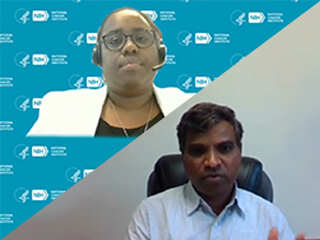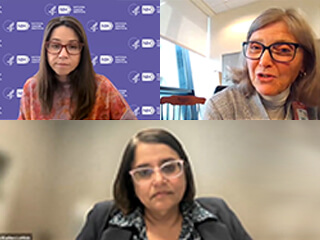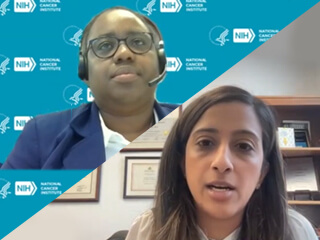Cancer prevention videos and webinars related to DCP programs.
-

Age is the number one risk factor for cancer, yet older adults are often underrepresented in clinical trials. This video highlights groundbreaking research showing how geriatric assessments can improve cancer treatment tolerability for patients over 70.
-

This webinar is rescheduled from January 28, 2025. Join us to kick off the 2025 season of Building Bridges in Cancer Symptom Science, where we will focus on the complex issue of cancer cachexia. Drs. Erin Talbert and Eric…
-

This webinar will focus on the role of cancer caregivers in promoting symptom management and optimal cancer outcomes. The speakers will discuss the importance of addressing caregivers’ wellbeing during cancer and interventions designed for the patient-caregiver dyad to optimize health and quality
-

In this installment of the Building Bridges in Cancer Symptom Science Webinar Series, the speakers focused on interventions for cancer-related cognitive impairment. Dr. Agnès Lacreuse discussed pharmacological interventions for cognitive decline induced by aromatase-inhibitor therapy in a...
-

Bladder cancer (BC) is one of the most frequently diagnosed neoplasms, with an estimated half a million new cases and 200,000 deaths per year worldwide. Men have a 3-4 times higher risk of developing bladder cancer than women.
-

In this webinar, Dr. Alberti discussed methods for studying chemotherapy-induced peripheral neuropathy (CIPN) in preclinical studies and building collaborative translational teams. Dr. Smith then addressed methods and techniques for assessing CIPN in clinical trials.
-

Dr. Weissman earned his M.D. and Ph.D. in immunology and microbiology in 1987 at Boston University School of Medicine. Dr. Weissman is a physician-scientist and pioneer in the science of immunology.
-

In 2020, cervical cancer resulted in over 600,000 deaths worldwide, despite being largely preventable through vaccination and screening. The disease primarily impacts women in low- and middle-income countries (LMICs), who represent 85% of the cases and 90% of the deaths.
-

In this webinar, Dr. Hinds reviewed advances in the screening and evaluation of fatigue in children and adolescents/young adults during and following cancer treatment. Dr. Kadan-Lottick then addressed the factors that contributed to fatigue, summarized evidence-based approaches to its treatment...
-

Pancreatic ductal adenocarcinoma (PDAC) remains a deadly disease and is projected to be the third leading cause of death by 2030. Contemporary immunotherapies have shown little to now response in PDAC.
